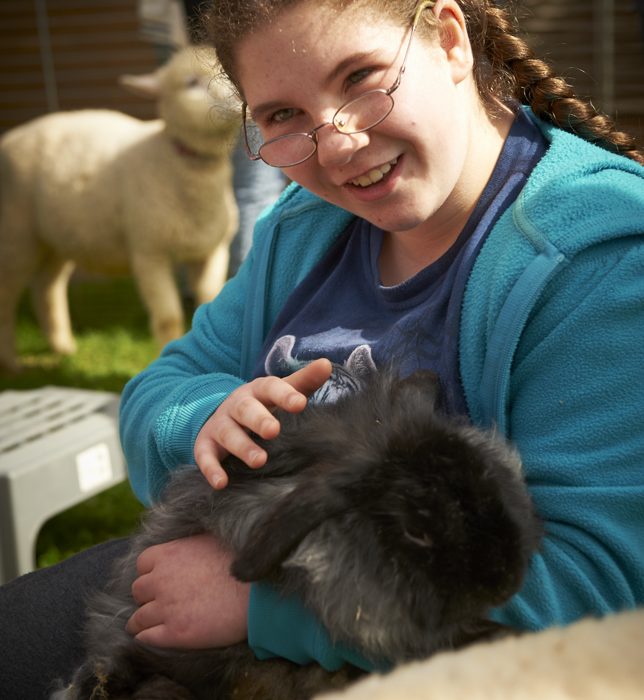Advice for extended family and friends
Diagnosis
A diagnosis of Prader-Willi Syndrome of a grandchild, niece/nephew, or close friend’s child can be distressing. Understand that as you support your child or sibling through their grief, fear, and joy surrounding their new baby, that you may also be experiencing the same feelings to some degree. Allow yourself space to process these feelings. You can take care of others much easier if you take care of yourself.
Prader-Willi Syndrome is a very complex syndrome and learning to care for this child will be ongoing and ever-changing.
If the new family already has children, your support role may be caring for siblings.
Siblings especially the younger ones need to spend time with Mum and Dad and also the new baby if possible. This may require leaving the NICU or special care nursery with the children and parents may appreciate your offer to stay with the new baby while they spend time with their other children. Always be guided by the parents as to how you can assist them. However, don’t be surprised if parents are not yet ready to leave their babies’ side.
Young siblings can sense the tension and concern surrounding the baby and they may act out for you without knowing the reason why. Older siblings will need to have an age-appropriate explanation of what is going on. Always try to include them in discussions about what is happening whenever possible, so they do not feel left out. However, unless you are asked, leave the main discussion for the parents and their children.
After birth and before diagnosis is a particularly difficult time for the whole family and hopefully, the parents will share the diagnosis with you when it is received. Although in some cases parents who are not coping may tend to withdraw or shut down. Try to be there for them, with the reassurance that this is a journey you are prepared to share with them.
Importantly you must abide by the wishes of the new parents in sharing the diagnosis with others. Do not tell others in your circle unless you are given permission. Sometimes a period of time with just immediate family is required for healing and to allow decision making.

New parents will be advised not to consult Google after receiving a diagnosis and the same applies to you. However, a majority will (and have done so) and so it is important to understand that everything EVER posted by ANYONE remains on the internet FOREVER. There is a lot of misinformation, outdated information, and information that is blunt, impersonal, and necessarily descriptive of every possible scenario for professionals.
As with all spectrum disorders, a child may not have all the characteristics associated with Prader-Willi Syndrome. Also, the degree to which they are affected can vary considerably from individual to individual and may vary in severity between each child and at different stages of life.
So, don’t read up and get ahead of yourself. Each life stage of a person with Prader-Willi Syndrome presents with its own challenges. Concentrate on learning how to support your newest family member now and remember that in every stage of life, parents report that their child with Prader-Willi Syndrome is loving, friendly, and very caring. They are certainly entertaining and love to make people laugh. Prader-Willi Syndrome affects only one chromosome pair, we all have 23 pairs, enough to make us all individuals and all unique.
Going forward
Although caring for a child with Prader-Willi Syndrome is in some ways the same as for all children, there are key differences.
In infancy, caring can be intensive with possible tube feeding, illnesses, appointments, and the fear of the unknown. It is difficult for the new parents to actually find the time to set aside for family time. New parents often carry the guilt of what they think they should be doing for all members of the family as well as the baby, and maybe can’t manage.
It is crucially important moving forward that you understand the advice generally passed on to new parents does often not apply. Try not to press your own views and opinions at this time. Now is the time for parents to listen to their doctors and health professionals, even though you may not agree with all the advice they are given. Some points of contention that have been raised between parents and extended family are:
- Having the baby in the parent’s room; this child is fragile and may not be able to make enough noise to alert parents of its needs.
- Carrying the baby around all the time; this has been proven to be beneficial. Instead, enjoy extra cuddles.
- Catering to their every need; infants with Prader-Willi Syndrome are often failing to thrive. They can’t afford to miss a feed and may in fact require more frequent feeds. Sleeping through the night is not a priority. Instead offer help around the house or looking after the baby or siblings so parents can catch up with sleep.
After infancy and heading into early childhood.
After the stage of failure to thrive and intense care of infancy, the early years can often provide a breather in some regards.
Illnesses are still quite common at this age, and time is often stretched by frequent essential specialists and allied health appointments. You can help by offering to prepare meals, clean, and care for siblings. Sometimes accompanying a parent to appointments is appreciated and will assist you in hearing what the specialists are advising and learning about Prader-Willi Syndrome.
Learning about Prader-Willi Syndrome is paramount is assisting a family living with the condition. Even if you live a distance away and are not in regular contact it is important that you learn about Prader-Willi Syndrome and its many complexities. General information gathered from trusted sources is great but more importantly, listen to the parents. Throughout the life stages of the child with Prader-Willi Syndrome, their needs change constantly.
Often parents are making the best choices based on the information they have. As different ideas are trialed and even mistakes made, your guidelines may be changed often. Be patient, the parents are trying their best.
You may see a parent “bending the rules”, that is life, but it is important you continue to act as requested. One person bending a rule when they are overseeing the big picture is very different to everybody doing the same, particularly when it comes to food.
Throughout childhood, you may notice your grandchild, niece, or nephew or friend child has a tendency to put on weight very quickly. This is caused by their body composition being more fat than lean muscle. Weight gain can occur regardless of a parent’s efforts. You can assist by being consistent with food guidelines and by offering incidental exercise. Children gain as much from visiting the playground, walking on the beach, or joining a sport or dance group as they can by enforced exercise. Do not shame a child for the way their bodies are built.
Food
During toddlerhood, the child with Prader-Willi Syndrome may look and act like any other child although developmental milestones are usually delayed. Don’t compare to other children, they will catch up in their own time. In this stage, it is very important to put in place the eating habits and routines that will continue throughout life. If left too late behavioral issues can be triggered when food becomes more restricted.
It is important to remember that the child is not being deprived. If anything, providing a nutritionally dense and healthy menu requires dedication and love. Remember that this is the child’s normal. Often a strawberry is as enticing as a lolly. On the flip side, a family not making these changes right now will need to do so when it is required.

The hardest thing for extended family and friends is not treating the child to food while in their care. In our society, treats are a Grandparents prerogative but treating the grandchild with Prader-Willi Syndrome without permission, particularly with food, is not showing love and can in fact make it harder for the child and may even result in the child not being left in your care.
If you have the child visit your home, you may notice that they are very food aware and keeping food, biscuits, and lollies out of sight will help them to enjoy their visit. Children with Prader-Will Syndrome are usually opportunistic when it comes to food. For those who have moved into the stage of full hyperphagia, beginning anywhere from (three to eight years of age), stealing due to the feeling of starvation is common, often requiring further steps to secure food access from pantries, fridges, sometimes freezers and in some cases bins and animal food. It is best to speak to the parents to know what food security is required.
It is a hard thing to learn that if a child with PWS takes food, they are not misbehaving. It is not a matter of will power but is a primal drive to seek food. The onus is on you to ensure food is unobtainable, so reprimanding a child when you have not provided the correct security is not appropriate.
Family gatherings can be particularly difficult for families living with Prader-Willi Syndrome. You can make it easier for the whole family by avoiding buffet type meals and/or removing food, plates, and scraps as soon as the meal is finished. Rethink birthday cakes, treats, Easter eggs, Halloween lollies, and Christmas treats. The parents will be very thankful for your thoughtfulness and will be happy to work with you to find solutions to suit everyone. Sometimes, however, there is no compromise and your choices may determine whether a family can continue to attend gatherings in the future.
Behaviour
Although food is a big focus of Prader-Willi Syndrome, with careful consideration it can be managed. Parents identify behaviour as their biggest issue when dealing with Prader-Willi Syndrome. Securing food can help some behaviours not to escalate but others require careful management.
Recognising the difference between a tantrum and a meltdown is the first step. All children have tantrums but in individuals with PWS they may continue into adulthood. A tantrum is best handled by not playing into the situation or arguing. Try distraction or distancing yourself if the child is safe.
Meltdowns often follow triggers that you may or may not have noticed. In general, don’t continue any argument. Distract, or try to work out what may ease the child’s growing discomfort. Meltdowns are a loss of control. You can’t argue or reason with a person who is having a meltdown. Ensure they are safe, offer comfort if possible, and remember that meltdowns can often be followed by feelings of regret and shame when finished, especially in older individuals. A long meltdown often results in a feeling of exhaustion for the person watching. The outbursts often result in the person with PWS being very remorseful and upset about what they have done.
Parents know their child best and can often help you to avoid the triggers. Information on other behaviours relating to PWS can be found in the relevant headings on this site.
It is easy for onlookers, including siblings to watch on and conclude that the child with PWS gets away with anything. This might be true in some cases but generally letting an issue go, waiting an extra 5 minutes for the child to finish a task, and giving consequences that are appropriate to their intellectual age and level of cognitive development is fair and appropriate. To carry on with a battle that in the scheme of things is unimportant can result in a meltdown that can last for hours. Distraction or redirection is not giving in and results in an easier life for everyone.

Extended families and the older child/adult.
As your family member or friend’s child gets older you will have benefitted from their caring and charismatic nature. You may have also experienced the flip side, the stubborn, explosive, and difficult behaviour resulting from frustration, lack of understanding, and other aspects of Prader-Willi Syndrome.

The following aspects of PWS are important to understand.
- Reduced cognitive development.
- Immature social and emotional skills
- Long term memory
- Need for routine
- Hyperphagia often resulting in an uncontrollable drive to access food
- Reduced ability to recognise the consequences of choices
- Meltdowns similar to those seen in young children often continuing well into adulthood
- A need to be understood and encouraged
- A love of feeling helpful and of praise
This is where your support is so important. Caring for an individual with Prader-Willi Syndrome can be both rewarding and exhausting. Dealing with Prader-Willi Syndrome behaviours becomes a skill of reducing triggers, recognising the signs, and riding out and supporting the child should a meltdown ensues. Often nothing can be done to avoid the event if the trigger is not recognised but there are things you shouldn’t do that may assist.
Understand these behaviours are not a result of bad, inefficient, or negligent parenting. If members of the extended family offer treats, undermine the parents, or don’t assist in making family areas food secure, that will just make everything worse. “Just a little bit” or “just this once” are harmful statements. Nothing is forgotten and when the individual’s diet is restricted, “just a little bit,” can mean a reduction at another meal to offset Kilojoules. This leads to disappointment and upset at the following meal.
Hyperphagia causes such a strong drive to access food that individuals with Prader-Willi Syndrome will often lie, manipulate the truth, or steal. To deal with these instances check your food security and if a claim seems unlikely such as claiming not to have been fed please check with the parents.
How can you help? Listen to the parents and learn their routines and lifestyle choices wherever possible. Assisting in helping your young family member to feel comfortable in a consistent environment will go a long way to ensuring a long, rewarding, and joyful relationship.
Most parents are under considerable stress. As parents, they not only have to deal with the complexities of Prader-Willi Syndrome, but they also must deal with their community that does not always have a good understanding of PWS. Dealing with NDIS, therapy, medical appointments, extracurricular activities, school, workplace, and day services requires constant negotiation, consideration, and effort.
Respite for parents can be a welcome relief if they can be confident that you will follow guidelines. Even family gatherings and being with the ones they love is rewarding for parents. If however, unsuitable food is openly shared in front of or is offered to their child, this compromises their food management plan. Free access to foods in a buffet or snacks left out on view causes a lot of anxiety for the person with Prader-Willi Syndrome (and their parents ), and any attempts to limit food access can result in behaviour outbursts. If this becomes the norm for extended family events, then the parents may have no choice but not to participate in these gatherings. This is an unfortunate loss for the whole extended family.
To a family living with PWS you are a lifeline and such an important extension of their family unit. Your love and support will be repaid tenfold, by your family member or friend, and a family with confidence that they can count on you.